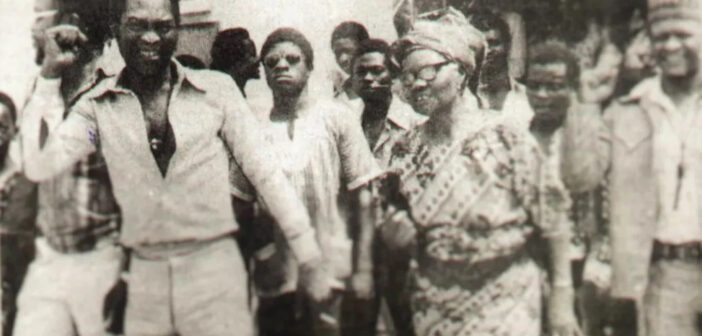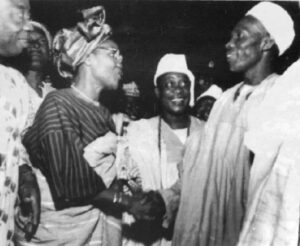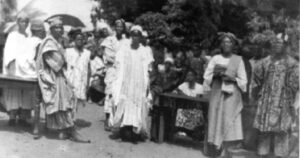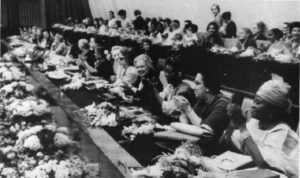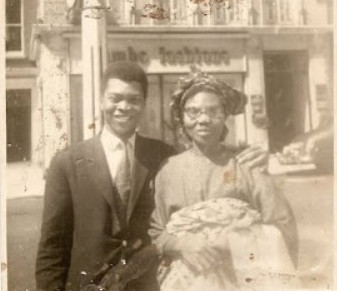It is uncommon in our world for a legend to give birth to another legend. In most scenarios, one is either the offspring of a legend or the parent of a legend. Fela Ransome-Kuti, whose name and iconic music is celebrated across the globe, is a bona fide legend. Equally befitting was his mother, the fearless gender and political activist, Funmilayo Ransome-Kuti.
Funmilayo Ransome-Kuti turned into a trailblazing Nigerian educator, activist, and women’s rights pioneer whose existence and struggles have been brought to the big display screen in the currently released biopic “Funmilayo Ransome-Kuti.” Directed by Bolanle Austen-Peters, the movie offers a nuanced portrayal of this iconic discern, shedding light on her unwavering dedication to venture colonial rule and combat for the rights of girls in Nigeria.
Funmilayo Ransome-Kuti defied societal norms from an early age. She have become the primary lady scholar on the prestigious Abeokuta Grammar School, paving the manner for generations of women to pursue training. Her thirst for know-how and empowerment led her to marry Israel Ransome-Kuti, a teacher and activist who shared her revolutionary ideals.
Through this powerful movie, the legacy of Funmilayo Ransome-Kuti lives on, inspiring a brand new era to carry the torch of exchange and retain the fight for a just and equitable world.
Resistance from Colonial Authorities
As a vocal critic of British colonial guidelines, Ransome-Kuti faced extreme backlash and repression from the colonial government. She was arrested and imprisoned in 1947 for major protests in opposition to unfair taxation on girls. The colonial authorities additionally refused to renew her passport in 1958, accusing her of getting “communist leanings” due to her global travels to raise focus about the plight of Nigerian girls.
Opposition from Traditional Rulers
Ransome-Kuti’s activism once challenged the authority of traditional rulers just like the Alake (king) of Abeokuta, Sir Ladapo Ademola II. The Abeokuta Women’s Union, which she led, protested in opposition to the imposition of excessive taxes on girls by Ademola’s authorities, main to his temporary abdication in 1949. The Alake hired divisive processes to undermine Ransome-Kuti’s affect amongst women.
Patriarchal Societal Norms
As a pioneering feminist in a deeply patriarchal society, Ransome-Kuti confronted vast resistance from folks that sought to keep the subjugation of women. Her efforts to steady political representation and balloting rights for ladies was met with skepticism and opposition, even from inside her own party, the NCNC. She was denied the possibility to run for elected office on several instances because of her gender.
Earlier History
On October 25, 1900, Funmilayo Ransome-Kuti was born in Abeokuta, Egbaland. The Egba tribe of Yoruba, one of several politically independent groups with mutually understandable languages, inhabited a region between the Ogun River in the west, Eko (Lagos) in the south, and Ijebu in the east. Since the Egba had lived in the southwest of Nigeria for more than a millennium, they shared a highly developed socio-political structure and social hierarchy with other Yoruba by 1900. Women had access to the political system through the female-only IYALODE organisation, which means “Mother of the Town,” while being excluded from all four arms of government with the exception of the executive. This allowed women to be represented in administration and decision-making.
The single issue that propelled FRK into the political public eye in Abeokuta and then in Nigeria was the direct taxation system, which covered women. In actuality, colonial FRK was an Afrocentric feminist who understood that women were subjected to various forms of racial, gender, and class oppression and that the only way to end these forms of oppression was via women’s empowerment. Second, while actively fighting for women’s equality and justice, FRK was also a nationalist, which meant that she supported the abolition of colonization and all forms of dominance, both locally and nationally.
FRK was a nationalist who had little patience for ethnocentrism, despite her distaste for the material possessions of her class and status, her refusal to speak in English in public, and her avoidance of western clothing. She also didn’t think that customs should be followed just for their own sake.
She criticized Yoruba customs like kneeling or prostrating before an elder, spouse, or other titled person that she believed went against her egalitarian worldview. Her husband and she both declined to do so, and they both instilled this refusal in their kids.
While serving as the head teacher of the girls’ branch of Abeokuta Grammar School in 1923, FRK organised a group of young ladies and girls to form the Abeokuta Ladies Club. The majority of the Christian ladies in the group, who were middle-class educated Westerners, focused on picking up handicrafts and manners. When FRK and her husband relocated to Ijebu-Ode, they started a women club with similar goals. When they returned to Abeokuta, they continued these efforts by organising a variety of events for teenagers of all genders and taking on civic initiatives.
A friend and former pupil approached FRK in 1944 and brought her to a market woman who expressed her desire to learn to read. Market women were added to the ALC’s membership once it reorganised. mainly uneducated, Muslim, and impoverished women. This marked the official start of FRK’s career as a political activist. “To help in raising the standard of womanhood in Abeokuta… to help in encouraging learning among the adults and thereby wipe out illiteracy” was one of its stated goals. Wole Soyinka and his mother, who are FRK’s cousins, were among the members of the larger Ransom-Kuti family who were hired as tutors.
The National Union of Teachers was established by FRK’s husband and others in the interim, and the two organisations frequently collaborated in their advocacy of women’s rights. The ALC and FRK were made aware of the problem of price limits on food items sold by market women in 1945. To no avail, the ALC sent several delegates to the Egba Native Administration Council and the District Officer. Nevertheless, a week after the Daily Service newspaper published an article regarding the situation, rice confiscations stopped.
When FRK started listening to the market women, she was astounded to learn of the extent of the colonial and ENA exploitation of them. Conditional sales, for instance, put a great hardship on women who had extremely poor profit margins by requiring them to purchase both fast-moving and slow-moving commodities together. An additional instance involved the imposition of food sales quotas to the government, as well as intimidation by law enforcement and Alake (Oba of Abeokuta) agents. FRK was taken aback by everything and is reported to have said, “We educated women were living outside the daily life of the people.”
She then decided to give up wearing western clothing forever and began donning traditional Yoruba wrappers “to make the women feel and know I was one of them.”
The women of Abeokuta were among the first women to be taxed by the colonial authority, hence the issue of taxes was very painful for them. Girls paid taxes at the age of fifteen, males at sixteen, and wives paid taxes apart from their husbands regardless of their income. The tax was seen by the women as “foreign, unfair, and excessive,” and they also took issue with how it was being collected. “Women were physically assaulted, stripped naked, and their homes were broken into. They were also imprisoned for not paying.”
As previously mentioned, the Alake was ultimately in charge of the collection because the British had instituted an indirect rule structure. As a result, he found himself at odds with the Abeokuta women, who had also lost their rights as a result of indirect control.
“Idowu [Alake], you have long utilised your penis as a sign of power that you are our husband. The women performed songs like the one translated below to mock the Alake during the protest. Today, we’re going to go the other way around and pretend to be your husband using our vagina. Vagina’s head will seek revenge, o ye men.”
The AWU grew to be a sizable dues-paying organisation with some 20,000 female members. They were successful in planning sizable protests. Everyone in the highly disciplined organisation was required to abide by the rules. The Alake of Abeokuta temporarily abdicated as a result of the long-lasting and intense anti-tax protest action, in which FRK was in the forefront of the women’s battle. Protests included large-scale gatherings and tax-paying refusals. It appears that FRK oversaw training sessions for these displays within her facility. When tear gas was fired, she demonstrated to them how to cover their mouths, noses and eyes with fabric. She also told them to retrieve the tear gas canisters and hurl them back at the police. The women, unable to obtain licences, referred to the protests as “festivals” or “picnics”. The fact that the women were so daring makes the demonstrations even more astounding when one considers the historical setting of 1947. Even the “ORO,” a purely masculine “thing or ritual” with alleged supernatural abilities, was put to the test by them. FRK once grabbed the ORO, which resembles a stick, and put it on display at her house. FRK and the ladies suffered greatly as a result of the anti-tax demonstrations, but they persisted and eventually got their demands met.
On January 3, 1949, “the Alake abdicated from the throne and the SNA system was changed and four women had positions in the new system of administration.”Alake would eventually regain power, and the flat tax on women was only momentarily removed, among other setbacks.
The next phase for FRK was to expand internationally and organise women at the national level. “At that time, no other Nigerian woman had the same level of exposure abroad.” The AWU changed its name to the Nigerian Women’s Union and started opening independent branches around the country. FRK was asked to speak to women’s organisations all around the country. The NWU sought to abolish the electoral colleges, grant women the right to vote, and give them proportional representation in politics. With 400 delegates from 15 regions, the NWU organised a two-day meeting in 1953 called the “parliament of women of Nigeria,” during which several resolutions pertaining to the political goals were enacted.
FRK presented a feminist awareness and ideology during the conference, recognising that women were conditioned by society to internalise a poor self-image and exhibit passivity and apathy. She continued by criticising bride prices and polygamy. FRK’s concerns extended beyond women’s issues. Despite the NCNC’s attempts to prevent women from joining the NWU and the Federation of Nigerian Women’s Societies (FNWS), she remained an active member of the NCNC and used her affiliation with these groups as a means of criticising the NCNC’s stance on women’s issues and policies. FRK was eventually kicked out of the NCNC for his persistent criticism of the party, which had since grown incredibly corrupt, and it keeps women out of the decision-making process.
FRK travelled to London in 1947 as a member of the NCNC delegation. FRK was invited to give several speeches during the two-month stay, one of which was concerning the status of women in Nigeria. She also penned a piece on the same subject that was copied and published in Nigerian newspapers as well as the British Communist Party journal, the Daily Worker. Women have suffered larger losses than men during colonial control, according to FRK:
Prior to the arrival of the British in Nigeria, men and women were both behind the labour industry. In society, women possessed property, engaged in trade, and held significant political and social power. Since the arrival of British control, women’s status has declined rather than improved via assistance and education. She also claimed that women were persecuted by the colonial system and its proxies, like as the Sole Native Authority in Abeokuta, and that they had lost their historical status as political and economic leaders. She and the Alake fell out once more when she wrote about how women in Abeokuta were left without even the most basic amenities in exchange for being forced to pay taxes that they could not afford. She also claimed that the women were “poverty stricken, disease ridden and malnourished” and blamed the British government for this.
The Lagos Market Women’s Association and the Abeokuta Women’s Union both expressed support for FRK’s views, and when she returned to Abeokuta, she was greeted with great fanfare. The Alake of Abeokuta responded to the article by criticising it.
The Rev. Ransome-Kuti passed away from cancer in 1955. FRK struggled for the following thirty years to establish and manage a number of schools, both with and without assistance from the local and federal governments. She also got entangled in a string of land-related lawsuits that cost her and her kids a great deal of money and that she was unable to prevail in. The family’s property at 14 Agege Motor Road was one of the ones that sparked controversy and is arguably the most notorious location in Lagos. FELA, FRK’s musician son, had been residing on the land. The military regime in Nigeria at the time felt as though FELA’s music was a thorn in its side. Like his mother, Fela was a Pan-Africanist and a supporter of traditional African culture.
The police and military frequently raided both Kalakuta and his club, “the Shrine.” A thousand armed soldiers surrounded 14 Agege Motor Road, Lagos, also known as Kalakuta Republic, on February 18, 1977. Olusegun Obasanjo, the former president, was the military government’s Supreme Commander at the time.
FRK, Bekolari, Fela’s brother, and Fela himself were all present that day. This raid was especially vicious. Without prior notice, the soldiers invaded the facility with clubs and bayonets, beating individuals, destroying property, and stripping women naked. At the age of 77, FRK was physically flung out of the window, suffering severe leg injuries and going into shock. She was pulled by her hair. The soldiers then set fire to the property. The “Kalakuta War” raid garnered significant media attention, compelling the government to launch an inquiry. Nevertheless, this was ineffective, and “overzealous unknown soldiers and to Fela” were held accountable for the entire episode.
For what transpired that day, nobody received any compensation, not even the Ransome-Kuti family. FRK’s physical and mental health were severely damaged by the raid, and witnesses claimed she had lost her “fighting Spirit.” The family’s lawsuit for damages from the Kalakuta raid was dropped a year later, allegedly because FRK complained, “Why are they doing this to us?” One of Nigeria’s real greats and one of the country’s rare RIGHTS advocates, she passed away in April of that year.
Mrs Kuti is reputed to be the first Nigerian woman ever to own and drive a motor car.
In an emotional tribute to his late mother, Fela recorded on of his most iconic track, ‘Unknown Soldier’
…….dem dey break, yes
dem dey steal, yes
dem dey loot, yes
dem dey f*ck some of the women by force, yes
dem dey rape, yes
dem dey burn, yes
dem dey burn, yes
dem dey burn, yes
dem commot one student’s eye, yes
dem break some some head
dem break some some head
dem throw my mama
Seventy-eight-year-old mama
Political mama
Ideological mama
Influential mama.
dem throw my mama out from window
dem kill my mama
dem kill my mama
dem kill my mama
dem kill my mama
dem kill my mama”……………

